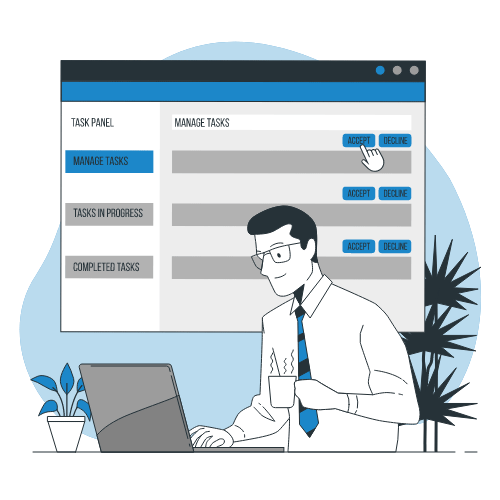The Philippines has long been one of the most attractive outsourcing destinations for businesses of all sizes — from startups and small businesses to large enterprises — due to its large population of highly skilled, English-proficient workers, relatively low labor costs, and strong government support for the industry.
Responding to the changes triggered by the pandemic, including the need to pivot to remote work, the Philippine government implemented policies that support flexible work arrangements while still providing significant fiscal incentives to business process outsourcing (BPO) companies. Additionally, improvements in technology and internet connectivity made it possible for companies to outsource work to the Philippines more easily. Today, the country holds a 10% to 15% share of the global outsourcing market and is steadily transitioning to more high-value services as automation and AI reshape traditional call centers.
Table of contents:
- Revenue of outsourcing companies in the Philippines
- Top BPO companies in the Philippines
- Growth of the BPO industry in the Philippines: 2010 to 2019
- The Philippine BPO sector during and after the pandemic
- Ongoing shifts in the global business landscape
- How outsourcing to the Philippines works
- The most outsourced services to BPO companies in the Philippines
- What to know before you outsource
- How to get started with outsourcing to a BPO company in the Philippines
Revenue of outsourcing companies in the Philippines

The BPO industry in the Philippines began to gain significant momentum in the early 2000s and rapidly grew to become a major economic driver, defying even the global slowdown triggered by the 2008 financial crisis. From 2008 to 2010, the sector posted an impressive annual average revenue growth of 26%, with the Philippines closing that decade as the world leader in BPO, surpassing India.
Top BPO companies in the Philippines
Here are some of the leading companies in the Philippine BPO industry:
1. Sourcefit
2. Concentrix
3. Foundever
4. ePerformax
5. Straive
6. TTEC
7. Accenture
8. Genpact
9. Infosys BPM
10. TP
Growth of the BPO industry in the Philippines: 2010-2019
While most sectors in the Philippines contracted during the financial crisis, the BPO industry benefited from the slump as businesses in major outsourcing markets, such as the US, offshored more functions to cut costs. As a result, the Philippine BPO industry continued to expand and mature at a healthy clip, maintaining double-digit growth from 2010 to 2015.
In 2011, the sector accounted for 4.9% of the country’s GDP, with its $11 billion revenue and 638,000 full-time employees (FTEs). The following year, its GDP contribution climbed to 5.4% as it posted $13.5 billion in revenue and breached the 700,000 mark in FTEs.
One of the country’s fastest-growing sectors during that period was healthcare BPO, which grew fourfold from 2010 to 2012 following healthcare-related legislative changes in the US and Europe. The Philippines was well-positioned to absorb the increase in outsourced healthcare information management work due to its large talent pool of healthcare workers, particularly nurses whose education mirrors US medical practices and standards. To this day, the Philippines is among the top outsourcing destinations for healthcare, which is key in driving the local BPO sector’s shift to more high-value operations.
By 2014, the Philippines had cornered 12.3% of the global BPO market, from just 4% in 2004. With $18 billion in revenue, this was also the year when the sector breached the 1 million mark in terms of job generation, becoming the country’s largest private employer at 1.03 million people. The industry generated the added benefit of geographically distributed job growth.
A joint public and private sector initiative to identify cities outside Metro Manila, Metro Cebu, and Metro Clark as potential BPO investment destinations — called the Next Wave Cities Program, and rebranded in 2018 to Digital Cities — resulted in improved employment rates in provincial areas such as Bacolod, Davao, Iloilo, Laguna, and Pampanga, with countryside locations accounting for over half of new job creation for the period 2014 to 2019.
Indeed, in 2019, the Philippine outsourcing sector’s $26.3 billion revenue was driven largely by incumbents expanding their operations to the countryside, and the entry of new investors and locators, about half of which established global in-house centers (GICs). This lead up to 2020 also saw the local industry’s significant shift towards mid- and high-value skills, particularly in the areas of healthcare, accounting, and finance.

The Philippine BPO sector during and after the pandemic
The global health crisis of 2020 had an immediate dampening impact on the BPO industry, especially as the Philippine government enforced strict lockdowns across the country. But the nature of their business — servicing clients located in entirely different time zones and continents — positioned BPO companies to quickly adapt to remote work, transitioning about 70% of their employees to work from home during strict quarantine periods.
By the fourth quarter of 2020, the industry was already showing signs of recovery. And while the hospitality and travel sectors experienced steep declines, the healthcare, e-commerce and retail, banking, finance, and insurance sectors more than made up for the slack, driving the industry’s $26.7 billion revenue and 1.4% growth, and adding 23,000 FTEs to 2019’s 1.3 million headcount.
This resilience enabled the sector to rebound strongly in 2021, surpassing growth projected for the following year. Outsourcing service providers posted $29.5 billion in revenue, which represented a 10.6% growth, and added 120,000 FTEs to bring total headcount to 1.44 million. Industry organization IT & Business Process Association of the Philippines (IBPAP) attributed the resurgence to pent-up demand from global customers and increased confidence in the industry’s ability to provide the same quality of service even in a work-from-home setting.
Although growth slowed in the following years — from 10.3% in 2022 to 7% in 2024 — the industry continued to post impressive gains against a backdrop of global economic challenges and geopolitical instability. Demand for mid- and high-value skills also grew as the subsectors of healthcare and banking and finance led the strong performers. The industry closed 2024 with $38 billion in revenue and total headcount of 1.82 million.
Ongoing shifts in the global business landscape
Moving into 2025, the Philippine outsourcing sector homed in on one of the most disruptive tech advancements of the decade: AI. According to IBPAP, many outsourcing companies are already testing AI use cases and finding success, notching productivity and efficiency gains of more than 14%. But the technology’s potential threat to BPO workers is not lost on the industry.
Management consulting firm Avasant estimates that the sector could lose 300,000 jobs to AI in the next five years. Conversely, this rapidly advancing technology could create up to 100,000 new jobs around skills such as training algorithms and curating data. A 2024 IBPAP survey bears this out: while 8% of respondents reported they reduced their headcount due to AI, 13% reported hiring more workers.
To make sure it is well-positioned to take advantage of these opportunities, the Philippine outsourcing industry is focusing on upskilling its workers, building up their capabilities around in-demand areas such as IT support, cybersecurity, data analytics, and, of course, AI. The industry is also working with the public sector and the academic community to support digital learning to better prepare Filipino students to thrive in the new world of work.
As the largest private sector employer in the country and a major driver of the economy, the Philippine outsourcing sector is expected to continue expanding despite disruptive forces that are already reshaping the business landscape. IBPAP’s industry roadmap projects revenue reaching $59 billion by 2028, with jobs in the sector expected to hit 2.14 to 2.55 million.
How outsourcing to the Philippines works
Outsourcing to the Philippines works through several common outsourcing models. Companies will typically hire a Philippine-based provider to handle the recruitment and management of employees, a model often referred to as offshore staff leasing. For specific, time-bound needs, companies may opt for project outsourcing. These employees may be based in the Philippines or work remotely from other locations. The Philippine-based outsourcing company will typically handle all aspects of the employment, including managing the employees, handling customer service and support, and ensuring that the work is completed on time and to the required specifications.

The most outsourced services to BPO companies in the Philippines
Some of the most outsourced services to offshoring and outsourcing companies in the Philippines include:
1. Customer service
Many companies outsource their customer service operations to BPO companies in the Philippines, which can provide a wide variety of AI-powered services. This includes specialized areas like e-commerce customer service outsourcing, live chat support outsourcing, and multilingual customer service outsourcing across channels such as phone, email, and social media.
2. IT support or technical support
The Philippines has a large pool of highly skilled IT professionals, making it a popular destination for IT support outsourcing. Common services include help desk outsourcing and specialized remote IT support outsourcing services.
3. Back-office support
The country is a go-to location for companies looking to outsource back-office functions through outsourced administrative services. This includes tasks such as data processing outsourcing, and outsourcing accounting and bookkeeping services.
4. Content creation
The Philippines is known for its large pool of skilled writers, editors, and graphic designers, making it a popular destination for outsourcing creative services. This includes content marketing outsourcing for strategy and writing, as well as graphic design outsourcing for visual assets.
5. Healthcare
The country is also known for its highly skilled healthcare professionals, many of whom are educated and trained in US healthcare standards and practices. This makes the Philippines a popular location for healthcare BPO outsourcing. Key services include medical billing outsourcing, medical coding outsourcing, and processing medical claims.
6. Sales and marketing, Telemarketing
The Philippines has a great number of experienced and skilled professionals who can take on a variety of sales and marketing functions. Popular choices include telesales outsourcing, social media outsourcing, and email marketing outsourcing for lead generation and appointment setting.
As the industry evolves and matures, different outsourcing providers may grow to have different specialties and areas of focus, so you should research and make sure the provider you are considering has the specific skills and experience you need.
What to know before you outsource
There are a few things you should consider before outsourcing a business function.
First, you should carefully evaluate the cost savings and other benefits of outsourcing. For example, many companies explore outsourcing accounting services for small businesses or look for cost-effective outsourcing solutions for startups to manage growth without high overhead.
Second, you should thoroughly research potential outsourcing partners to ensure that they have the skills, experience, and resources to deliver the services you require. This may involve reviewing their past performance, talking to other companies that have used their services, and conducting on-site visits to their facilities. Top BPO companies like Sourcefit, for example, encourage on-site visits to enhance transparency and trust between clients and providers.
Third, you should carefully define the scope of the work that will be outsourced, and create a detailed contract that outlines the responsibilities and expectations of both parties. This will help ensure that the work is completed to your satisfaction and that there are clear guidelines for resolving any disputes that may arise.
Overall, it is important to carefully consider the pros and cons of outsourcing, and to carefully plan and manage the process to ensure its success.
How to get started with outsourcing to a BPO company in the Philippines
If you are interested in outsourcing to the Philippines, the first step is to identify the business functions you want to outsource. This will help you determine the type of outsourcing partner you need, and the specific skills and expertise they should have.
Next, you should research potential outsourcing partners in the Philippines. This may involve searching online for companies that offer the services you require, or asking for recommendations from other businesses that have experience with outsourcing to the Philippines. When evaluating potential partners, be sure to consider factors such as their experience, their track record, and the quality of their facilities and employees.
Once you have identified a potential outsourcing partner, the next step is to negotiate and sign a contract that outlines the scope of the work, the responsibilities of each party, and the terms and conditions of the outsourcing arrangement. This contract should be carefully drafted to ensure that it accurately reflects your expectations and protects your interests.
Finally, you should have regular communication with your outsourcing partner to monitor progress and provide feedback and support as needed.
To learn more about outsourcing, you can read our Top 8 Qualities of an Outsourcing Company in the Philippines article. Please follow our LinkedIn page and visit our Services page to find out how we can connect you with exceptional talent while lowering your costs.
About us
Sourcefit is an award-winning US-managed business process outsourcing company based in Manila, Philippines. With a workforce of more than 2,000 employees, we proudly serve over 200 clients ranging from small businesses to Fortune 500 corporations. Our global centers can serve multiple markets, and our staff is highly proficient in English, Spanish, French, and Portuguese. Whether you need a few or many employees, we can help you achieve your business goals and build high-quality offshore teams.
RELATED PAGES
- Outsourcing in the Philippines: Start With Great Staff and Build a Process to Last
- Business Process Outsourcing in the Philippines
- The Top Outsourced Medical Billing Companies in the Philippines
Not sure where to start? Connect with us and see how Sourcefit can help you grow your business.











